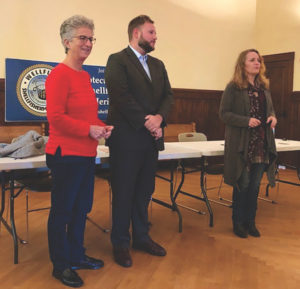WELLFLEET — State Rep. Sarah Peake and Sen. Julian Cyr appeared before a friendly crowd of shellfishermen at Preservation Hall on Nov. 1 and told them what they wanted to hear: that the so-called Cutler bill, H. 746 before the state legislature, has virtually no chance of becoming law.
The legislation was originally promoted by the Mass. Aquaculture Association and has been associated with the Mass. Shellfish Initiative (MSI). Last week’s session was organized by the Wellfleet Shellfishermen’s Association, which has opposed the bill because of what its members believe is its potential to disrupt the town’s traditional way of assigning and transferring aquaculture grants by allowing them to be sold to the highest bidder.
Ginny Parker, an organizer of the local shellfishermen, said that their association now has more than 160 members.
Cyr noted that he is one of eight members of Senate President Karen Spilka’s leadership team, and that Peake is one of eight members of House Speaker Robert DeLeo’s leadership team.
“Because of our positions,” he said, “if we’re not on board with it, it ain’t gonna happen.”

Peake noted that she had gotten herself appointed to the MSI task force as a way of helping to shape the agenda for the initiative. “If you’re not at the table, you might be on the menu,” she said.
“There has to be a broader conversation about how people can get into the industry and how licenses are transferred,” said Peake. “How does someone who has created equity in their brand through hard work get compensated? It can’t be one size fits all. There has to be flexibility. These are important issues.”
Helen Miranda Wilson, a member of the select board, argued that the Cutler bill was unnecessary.
“Under chapter 130 [of Mass. General Laws], any municipality could enact what they want to do in the Cutler bill,” she said. “Why do they want to make all of us do it that way?”
“Nobody bothered to turn to the next page of the statute book,” replied Peake.
Discussion at the meeting turned several times to so-called 208 plans requiring towns to reducing nitrogen levels in waterways and coastal embayments. Some have argued that oysters, as filter feeders, should be cultivated as an alternative to costly sewer systems and treatment plants. This alarms growers who see a market glut causing a price collapse.
“Wellfeet is producing 10 million oysters a year and our nitrogen has gone up,” said Michael DeVasto, a shellfish farmer and Wellfleet selectman. “They’re talking about 21 million more oysters. I don’t know what you do with all of those. It’s a huge threat.”
“There ways to manage 208 oysters so maybe they don’t go into the same market stream,” said Peake.
“I think we’ve put too much on oysters to clean up the water,” said Cyr. “Most of it needs to be pipes and pumps. The science doesn’t back up that aquaculture is going to solve the nitrogen issue. Having pipes and pumps means we can build with more density, which means more places to live for not rich people.”



